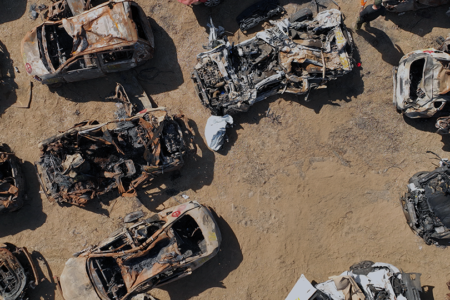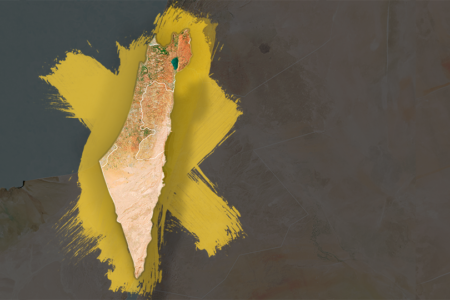The Life, Times And Message Of Isaiah The Prophet Aug/Sep 1974
ISRAEL PLEADS WITH THE LORD AND CONFESSES HER SINS
ISAIAH CHAPTER 64
- Oh, that Thou wouldst tear the heavens apart and come down,
That the mountains might melt away before Thy presence. - As fire kindles dry twigs and makes water bubble up.
So make Thy name known to Thy enemies,
That the nations might tremble before Thee. - When Thou didst awesome things.
For which we did not look,
Thou camest down and the mountains melted away before Thy presence. - Since the times of old, no man has heard, nor perceived by ear,
Neither has eye seen a God besides Thee,
Who works for him that waits for Thee. - Thou didst meet him who rejoices to work righteousness,
Who remembers Thee in Thy ways.
Behold, Thou hast been angry with us, and we sinned,
We have continued long in these ways,
That we might be saved. - All of us have become as one who is unclean,
And all our righteousness is like a filthy rag.
We all fade away like a leaf,
And our iniquities carry us away like the wind. - And there is none who calls upon Thy name,
Who bestirs himself to take hold of Thee.
For Thou has concealed Thy face from us
And hast consumed us through our iniquities. - But now, O LORD, Thou art our Father,
We are the clay, and Thou art our potter.
We are all the work of Thy hand. - Be not, O LORD, angry with us to the utmost,
And do not remember iniquity forever.
Behold, consider, we beseech Thee, we are all Thy people. - Thy holy cities have become a wasteland,
Zion is a wilderness; Jerusalem, a desert. - Our holy and beautiful house,
Where our fathers praised Thee is burned by fire,
And all that which was our delight is in ruins. - Wilt Thou, O LORD, in spite of all these things, restrain Thyself?
Wilt Thou be silent and afflict us to the utmost?
Comment:
1-3 A plea for Jehovah’s renewed mercy
1 Oh, that Thou wouldst tear the heavens apart and come down
In the Hebrew text this verse closes chapter 63, but in the English version it is more appropriately placed at the beginning of chapter 64. Israel’s situation is so desperate and hopeless that only God’s personal intervention can save her. The cry that God might tear apart the heavens and come down to earth is probably the most passionate outburst of the human soul. And so once upon a time when the cup of suffering and woe was full, God heard and answered that cry and actually came down to earth.
That the mountains might melt away before Thy presence
The twofold reference to “the mountains melting away” and to the fire burning the desert brushwood indicates that the prophet thinks of the theophany at Mt. Sinai with all its terrifying phenomena. In her present desperate situation Israel again needs such divine intervention to save her from her enemies and to make known to the nations who hold the name of Jehovah in contempt that He alone is the omnipotent God.
3 When Thou didst awesome things, for which we did not look
This verse partly complements and partly repeats the preceding verse.
4 Since the times of old, no man has heard, nor perceived by ear
From extolling the fearful and unexpected miracles of the past, the prophet now expresses his faith in what Jehovah will yet do for those who wait for Him. It will be more amazing than anything He has done before and beyond what men can ever perceive. The Apostle Paul refers to this passage of Isaiah in a free paraphrase:
“As it is written: Eye has not seen, nor ear heard, neither have entered into the heart of man, the things which God hath prepared for them that love Him.” 1 Cor. 2:9
5 Thou didst meet him who rejoices to work righteousness
This is another difficult passage. The Hebrew word, “pagatha”—”Thou hast met,” usually has a hostile connotation. But here it is used in a positive sense, that God graciously meets those who rejoice in doing justice and remember Him, as they walk in His ways.
Behold Thou hast been angry with us, and we sinned
The prophet is contrasting God’s favorable dealing with those who rejoice to walk in His ways with His anger toward the obdurate sinners. Lack of repentance is in itself a sign of divine anger.
We have continued long in these ways that we might be saved
This is a difficult text. The KJV translates it, “In those is continuance and we shall be saved.” This leaves the meaning obscure. In the first part of the sentence we translated “olam”—which usually means “ancient or everlasting” as “we have continued a long time in these ways,” which makes better sense. Disobedience to Jehovah brought on disaster.
6 All of us have become as one who is unclean
The prophet delves deeply into the moral and spiritual degradation of his people, comparing their state to a plague of leprosy. According to Lev. 13:45, anyone afflicted with this dread disease was kept in isolation and wherever he went was obliged to cry “unclean, unclean” to prevent others from becoming contaminated by him.
And all our righteousness is like a filthy rag
This is one of the prophet’s most scathing descriptions of what people usually call “righteousness”. In the sight of the Holy God even their so-called righteousness is nothing but a filthy, cast-away rag. We sense the same moral outrage and disgust which Isaiah voiced in the opening chapter of his book.
We all fade away like a leaf, and our iniquities carry us away like the wind
Without spiritual health the nation is devoid of staying power; it fades away like a leaf and is carried away by the wind.
7 And there is none who calls upon Thy name . . . to take hold of Thee
Spiritual indolence and indifference have taken a hold of the nation, so that there is no one to storm the heavens for mercy and forgiveness. This is because God has concealed His presence from the people and has permitted their own degeneracy to take its natural course.
8-12 A broken-hearted prayer to God for compassion in view of all of the calamities which have befallen the nation.
8 But now, O LORD, Thou art our Father, we are the clay and Thou art our potter
Having unsparingly uncovered the sinfulness of his people, the prophet casts himself and his people on the mercy of God. He is their Creator, He is their Father. They are merely clay in the potter’s hand. He can make them or break them, according to His will.
9 Be not, O LORD, angry with us to the utmost
Israel has been punished sufficiently. God cannot hold against them their iniquities forever, else they must perish.
Behold, consider, we beseech Thee, we are all Thy people
Israel may have become a prodigal son; nevertheless, they are still God’s people.
10-12 A lament over Israel and her desolate country
10 The holy cities have become a wasteland. Zion is a wilderness; Jerusalem a desert A heart-broken and dramatic description of “the holy cities” which have become a wilderness. 11 Our holy and beautiful house . . . . is burned by fire
And all that which was our delight is in ruins.
The Temple which was the visible emblem of Jehovah’s presence amidst His people, all their delight, their pride and joy is now in ruins. All this was surely a sign that Jehovah has abandoned His people.
12 Wilt Thou, O LORD, in spite of all these things, restrain Thyself?
Can God continue not to be moved by the extreme calamity of His people? Can He be silent and continue to afflict them? With these tormented questions, Isaiah closes his plea for Divine mercy for Israel.







